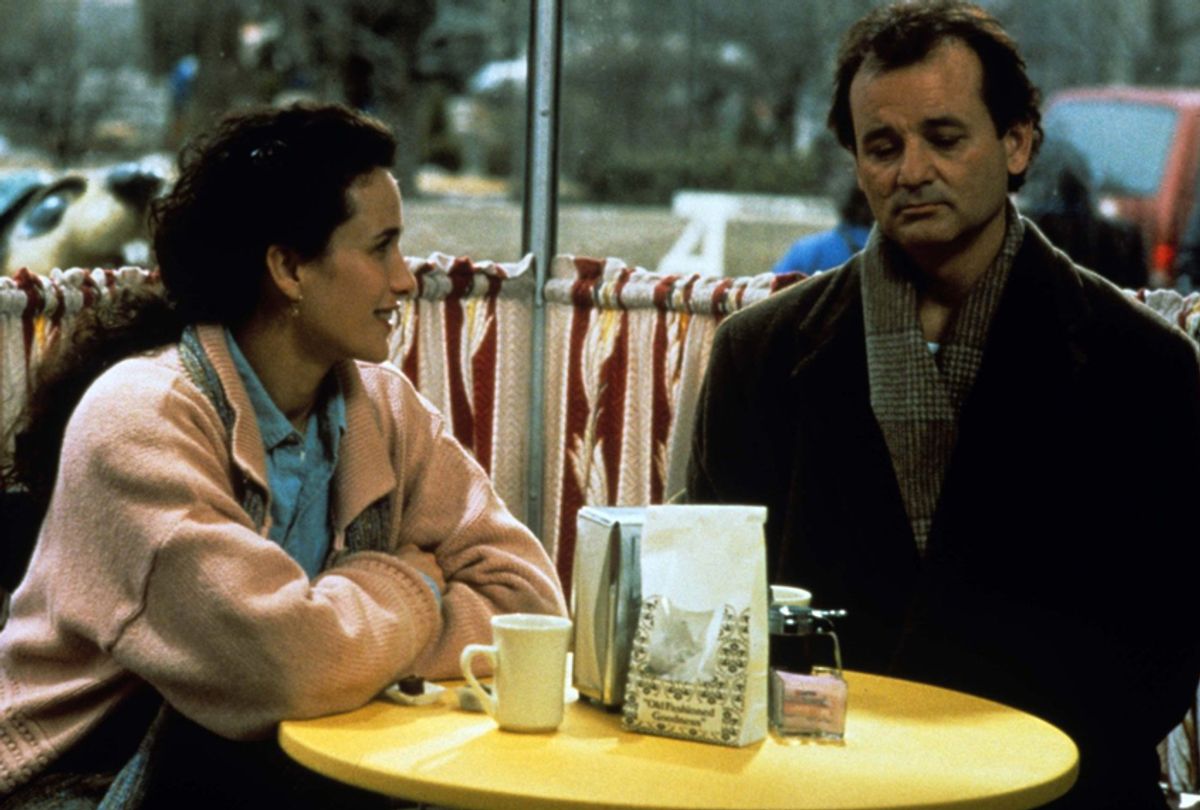One of the great joys of a classic film is the way your relationship with it keeps evolving. It changes as you change and the world changes. And 25 years on, wow, does "Groundhog Day" — a tale of connection, redemption and decluttering your bucket list — feel exactly like the movie I need right now.
On February 2, the most famous rodent in the world, Punxsutawney Phil, will emerge from his Pennsylvania dwelling and use his shadow-casting powers of prognostication to determine the duration of the remainder of winter. A few days later, the film that sealed Phil's fame will celebrate its milestone birthday. Since its 1993 debut, director and co-writer Harold Ramis' comedy about glib weatherman Phil Connors (Bill Murray) forced to relive the same dreary winter day over and over again until he gets it right has inspired a Broadway musical and been shown in NYU Buddhism classes. The film's surface appeal is in its slapstick and romance, but its durability is in its ability to tap into the profound recurring questions of life: What am I doing with my time? Does anything I did today even matter? If I had a second chance, would I learn anything, or just keep making the same dumb mistakes? And why won't the universe just tell me what the hell is going on here?
When I saw "Groundhog Day" for the first time as a young person, I was charmed by it. It seemed very much a product of its early-'90s era, a spiritual cousin to Albert Brooks' mystical 1991 dramedy "Defending Your Life."
Now that I'm more in the ballpark of the age Ramis was when he made "Groundhog Day" and carrying my own lengthy string of regrets and failures behind me, however, I am far more deeply dazzled by it. Now, I see more clearly and painfully how much we value wringing 40 hours of work out of an eight hour day. How we consider "Hustle" a motivational mantra. And how we tweet and Instagram out our peak moments and cleverest thoughts, seemingly YOLO-ing ourselves to death. That's why I love "Groundhog Day," a story of what's beyond the hustle, all the more.
Phil, cursed with infinity itself, cycles through stages of disbelief, decadence and despair until arriving at pure, determined effort. Fans of the film know by heart the scenes of him learning French and piano and playing card flicking, all while honing a perfectly timed feel for the rhythms of the town and its denizens. But in the end it's not, as one critic called it, Phil's now "effortless" aptitude for party tricks that liberates him from Punxsutawney purgatory. Nor is it his refinement of his techniques to woo his love interest Rita (Andie MacDowell) by pretending to be her ideal match — a ruse that results instead in a cascade of face slaps.
No, what liberates Phil is figuring out how to put aside his most selfish motives and be of service to others. It's when he learns to love and possibly be loved in return, which for many of us is far more difficult than playing Rachmaninoff's "Rhapsody on a Theme by Paganini." And Phil gets there by making a million ridiculous mistakes. Perfection doesn't save Phil. Vulnerability and compassion and being present to other people's experiences, that's his ticket.
The problem of what to do with the cruelly short span of time we are granted is a subject that perpetually fascinates and haunts us. We're encouraged to live each day like it's the last, to cram as much experience into life as possible. Yet I know from having had a fatal disease with a catastrophic prognosis that getting more time doesn't necessarily compel a person to start jumping out of airplanes or mastering the tango, or for that matter, rescuing kids who fall from trees. Me, I just got that waffle iron I'd meaning to get around to buying. But I do generally try to be a kinder, more empathetic person, because in the end, that's the pretty much all that actually matters.
Thinking about "Groundhog Day" now, I'm reminded of a January Medium story by J. Kelly Hoey about learning the difference between networking and building true networks, and her advice to "making a choice to notice. To be present. To care about the people you interact with regularly." It's a great plan, whether you're trying to advance in your career or escape the cruel caprices of the gods.
In the decades since "Groundhog Day" endeared itself to moviegoers, few other comedies have so capably taken on its existential quandaries — or even tried to. The film's closest contemporary relation is easily "The Good Place," a clever sitcom that happens to be about ethics, philosophy and how to maximize one's eternity. And in both Pennsylvania and the sadistically designed afterlife, there are no shortcuts to enlightenment. As James Poniewozik astutely noted in the New York Times, the show has "avoided falling into easy moralizing by committing to the idea that becoming good is hard work." In an era when goodness and generosity feel so acutely under assault, it feels supremely sustaining to be reminded of why it's worth the effort.
The traditional hero's journey tale involves a grand challenge and a limited amount of time to achieve it. "Groundhog Day," bless its weird heart, takes a different approach, reminding that life often amounts to lots of little opportunities we're usually too wrapped up in ourselves to take. And what saves your soul isn't standing on a stage having people applaud for you, or flawlessly showing off a new skill. It's just waking up to a new day knowing there are people in the world you care about, and a fresh set of chances to show them just how much. Again and again and again and again.



Shares